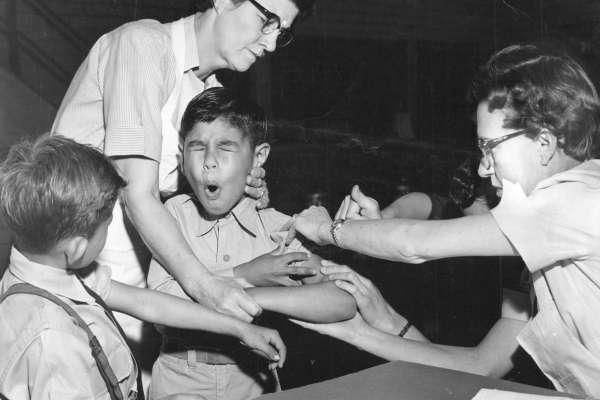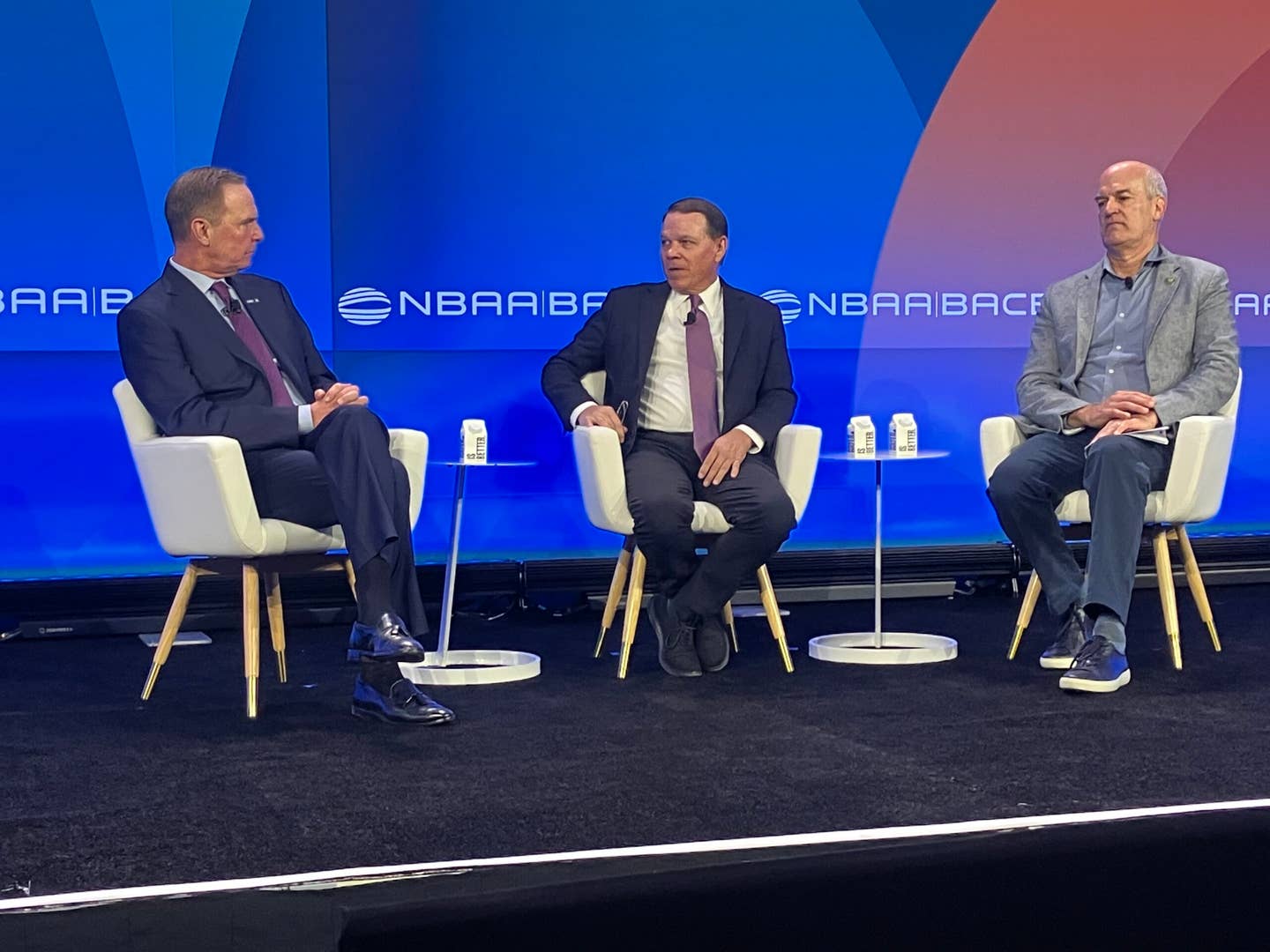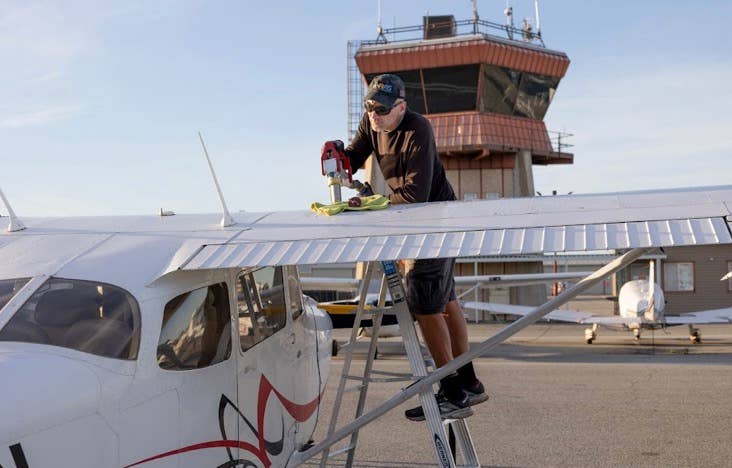Vaccine Passport: Stop Crying, Get Your Shot
Perhaps it could accelerate airline recovery. It’s pretty clear what we’re doing now won’t.

Credit: San Antonio Express News
When I was growing up in the 1950s, those boring, golden years between the unmitigated glory of World War II and the current mass hysteria we call modern life, my father had a veritable library of succinct phrases to suit each child-rearing challenge. At the blink of an eye, he could lapse into Autophrase Select mode and hurl one of these at me.
“You’ll eat it and you’ll like it!”
“Don’t make me come [up] [back] [down] [over] there!”
“Do [insert commanded action] or I’ll give you something to cry about!”
I’ll pretend I remember he used choice [C] when I surely cried about getting the polio vaccine around 1956. In those days, they used glass syringes about the size of a grease gun and the needle was so long, the doc had to be careful not to drive it plumb through and pin your arm to your chest. You got a cherry sucker to shut you the hell up.
Social media not being a thing then and the slippery slope to tyranny having been more of an us-against-the-Nazis just a few years prior, if I’d had the temerity to mount a reasoned, impassioned anti-vax stance, my father would have, as they say in the modern military, gone kinetic. That would be unlisted choice [D], which involved welts from a willow switch or a boxed ear. Corporal punishment was, and is, underrated. To attend school, you got vaccinated. Period. If anybody whined, they got over it.
And now comes Qantas, the Australian airline, proposing a similar strategy for passengers flying on its airplanes. Proof of COVID-19 vaccination will be required for international travel on its aircraft when the vax becomes available. They’re debating requiring this for domestic flights. Is this a good idea? Yes, in my view, it is. Does it erode your rights? Yes and no. Yes, because as a condition of service, they’re insisting you to do something you might not want to do. No because your right to fly on an airliner owned by someone else is neither protected nor absolute. I’m sure someone will sue to test that.
I suspect Qantas came to this decision in the context of Australia’s promising effort to contain the SARS CoV-2 virus. As of this week, the U.S. case rate is 38 times higher than Australia’s; the death rate in the U.S. is 23 times higher. A caveat: The data on COVID-19 infections and death rates is of questionable accuracy and reliability. But we’re working with what we’ve got.
With Qantas leading, we now pause and see if other airlines will follow. If I were guessing, I would say the Asian carriers will lead, followed by Europe. I would expect U.S. carriers to be paralyzed by the utterly polarized reaction to COVID-19 risk. This week’s AVweb poll asks if readers would favor an airline requiring the vaccination against one that did not. At the moment, it’s 41 to 35 in favor of vaccination required.
The airlines are currently in a quandary unique in their history. Passenger traffic is trickling back but at a far slower pace than they need to avoid massive restructuring. On the Sunday following Thanksgiving, 1.1 million passengers flowed through TSA checkpoints—about 39 percent of the volume of a year ago on the same day. That was cause for minor rejoicing but it might be short-lived if we see the spike in COVID prevalence public health authorities are warning about.
So what is the problem here? Everyone assumes—me included—it’s lack of confidence in COVID mitigations, such as they are, that keeps people away from the airports. To that, I would add an utter inability at almost all levels to assess realistic disease prevalence and thus risk. I still have a few friends who insist it’s all a big hoax and I don’t try to penetrate their thick skulls with whatever facts are available.
I’ve been asking airline pilot friends and recently, the flight attendant and pilot unions, for case data. Everything is anecdotal and secondhand. If formal data collection or surveillance exists, it’s not being revealed. Given the profound economic damage and death toll of this virus, this is sadly emblematic of our entire disjointed response. On the plus side, an airline friend was recently contacted by his company and told he had been exposed to a crew member with COVID. So at least some contact tracing is going on.
After months of frustration, I finally concluded that for me personally, the best risk metric is probability of hospitalization, because that data isn’t clouded by “died with or died of” fuzziness. If you need hospitalization, you may be on the way to long-term lung, heart and other debilitating effects. In Florida, so far, one in 400 residents have been hospitalized with COVID overall. For my age, it’s probably twice that so call the risk one in 200. That’s not huge, but it’s not trivial, either. It’s five times the risk of a skydiver experiencing a main parachute malfunction and having to use a reserve. It’s 500 times the rate of dying in a general aviation accident. If I could have a vaccine to reduce any of those risks, yeah, I’ll take it.
Not so long ago, when you traveled internationally, you needed to show your Carte Jaune—the yellow card showing you had all the vaccinations required of the country you were entering. It was a basic and widely accepted foundation of public health. Although the Carte Jaune is still required by some countries, most no longer require it. One reason is that the very vaccines it documented wiped out the diseases they were supposed to prevent so the risk doesn’t justify the verification.
Qantas appears to be going in that direction on its own and perhaps others will follow, at least temporarily. Want to bet they’ll get some help from countries requiring vaccination for entry? This time the Carte Jaune may be digital. Maybe an app or QR code. That raises privacy issues, but what doesn’t? Ever use Google or Facebook? If a vaccine passport gains momentum, it could be a significant earlier reset for the airlines, not to mention a boost for tourism everywhere. Since I skipped Epidemiology 101 in school, I have no sense of what herd penetration is necessary to make a difference. It would seem like every vaccination helps.
Some people resist vaccination because they’re worried about side effects. I’m sympathetic. My doc recommended the new shingles vaccine this summer. The pharmacist said it could have “noticeable” side effects. I’ll say. Felt like a bad flu for 12 hours and a red, swollen injection site. The second dose two months later felt like a worse flu for 12 hours. But both were preferable to having shingles. In 1955, the year before I got my polio shot, the vaccine had been rushed to market and a bad batch with live virus made it into the supply chain. Some 40,000 cases of polio resulted, with 51 paralyzed and four deaths. Yet my father, who was a research chemist, had us vaccinated anyway. I assume he did this because what little risk remained was preferable to having polio.
I know some people won’t get the vaccine because they think Bill Gates is inserting microchips into their arms. (These do have the latest module for Windows 95, I’ve heard.) Or that it’s a government mind control program. These people are perfect marks for conspiracy videos on YouTube. I know because they send me the links.
So that leaves the rest of us to decide if a vaccine is worth what risk it entails against what benefits it provides. For me, it’s a trade-off. The vaccine efficacy looks good and worth whatever risk it has against a CT scan showing lungs like ground glass. And let’s have no illusions about a vaccine being a pandemic off switch. It’s unlikely to be for reasons related to distribution and acceptance.
But Qantas’ idea might accelerate things for those select populations flying or traveling in commercial airliners and might thus help the industry recover a little faster than it otherwise might. For me, that makes a vaccine worth it.






